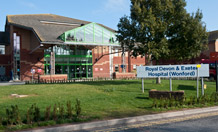
The RD&E is likely to save substantial amounts from its energy bill
University partnership with RD&E secures £1.1 million for energy saving
The Royal Devon and Exeter NHS Foundation Trust (RD&E) has been successful in obtaining a £1.1 million grant from the Department of Health, in part as a result of work undertaken by the Centre for Energy and Environment (CEE) at the University of Exeter.
The funding came as a result of a national competition which had allocated £50 million in 2013-14 for NHS Trusts and Foundation Trusts to fund new and innovative capital projects to improve energy efficiency.
The RD&E has been working with the University of Exeter since January this year as part of the South West Energy and Environment Group (SWEEG), a collaborative research partnership between public sector organisations in the South West which focuses on energy and environmental issues in the built environment. The CEE at the University carries out research on behalf of the group and coordinates its activities.
Working closely with staff at the RD&E, the CEE performed an energy audit across the Wonford site and using benchmark data identified areas where energy use was particularly intense. The energy split is approximately two-thirds gas and one-third electric with a small amount of oil use although, in terms of cost, electricity accounts for more than half of the expenditure on energy. Five main buildings are responsible for 90% of the energy use on the site, these are also the most energy intensive and were targeted as the main targets for improvements and upgrades.
Tony Norton, Director of the Centre said: “The NHS is one of the biggest users of energy in the UK and in order to meet ambitious carbon reduction targets, local schemes such as this are absolutely essential. Not only will it benefit the RD&E, but we hope the lessons learnt can be used by other large energy users across the city and beyond.”
Specific measures at the RD&E will include replacing oil boilers with high efficiency gas boilers, better heating controls, improving heat recovery from the steam system, improving the efficiency of the main boilers and improving insulation on pipes and valves in plant rooms. Lighting around the site is being reviewed and options for low energy lighting and improved lighting control will be implemented. The efficiency of air handling will also be made better with the introduction of more efficient fans and filters. While the aim of the project is primarily to save energy, the improvements are also expected to deliver a better working environment for staff and provide wider community benefits.
Dr Tim Malone from the RD&E said: “As the medical representative on the team it is a real eye-opener to learn about some of the hidden complexities of energy needs in a large hospital – an area that doctors and patients rarely think about. Bringing in academic experts to work with our highly experienced NHS estates and engineering staff is hugely beneficial and maximises the chances of delivering the biggest cost savings.”
Savings are estimated to be in the order of £350,000 a year with a corresponding reduction in annual emissions of more than 1,600 tonnes CO2. All of the cost savings generated will be put into improving frontline services and the effects of the measures should be able to be felt immediately. The results will be closely monitored and used to encourage further savings at the RD&E and also for the benefit of other SWEEG members and large energy users across Exeter and beyond.
Date: 9 December 2013
